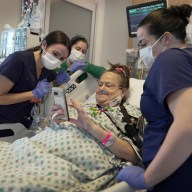 Michael Pernick says his childhood was “normal, but a bit difficult.”
Michael Pernick says his childhood was “normal, but a bit difficult.”
Credit: Michael Pernick/Adult Congenital Heart Assocation
Within seconds of Michael Pernick’s birth, it was clear something was wrong. He was what’s called a blue baby: His blood was not carrying enough oxygen through his tiny body.
Within two days, Pernick underwent surgery for a congenital heart condition known as Tetralogy of Fallot. Another surgery followed a few years later and then, two years ago, his third surgery repaired his heart valves. However, when a nearly fatal post-operative infection developed, things turned serious once again.
“I was so lucky to have a good team who knew all about me,” says Pernick, now a healthy 25-year-old. “I had great pediatric cardiologists and I was lucky to have a specialist as an adult. The difficulty is many people with congenital heart disease don’t have a specialist. Less than 10 percent have adequate care as adults,” says the Roslyn Heights, N.Y., native.
Dr. Jonathan Ginns, an adult congenital heart specialist at Columbia University Medical Center and a member of the ACHA Medical Advisory Board, agrees: “There’s only 500 certified doctors in the country and they’re mostly in the big learning institutions. There aren’t enough trained specialists working in the general medical field. Patients need a physician for their general health care who is board-certified [in] ACHA.”
Congenital heart disease is never cured. It’s a lifelong condition, corrected by surgery and sometimes involving medications.
“There are 30 different conditions that are classified as congenital heart disease,” says Ginns. “It can be any problem from a hole in the heart, to narrow valves, to malgrowth of one of the chambers. Or even blood vessels in the wrong location. It’s basically defects in the structure of the heart.”
Pernick, who is an Adult Congenital Heart Association ambassador, says his childhood was “normal, but a bit difficult. I got tired very quickly in the playground. So I never really played sports. As an adult, I try to be healthy, but I can eat anything within reason, the same as anyone else.”
What causes it?
Congenital heart disease is believed to be genetic and not linked to environmental elements in utero: “Elements of exposure are not the biggest concern; we suspect a lot of it is genetic,” says Ginns. “But, because these genes are so complex, it’s difficult to pinpoint genomes. Currently, there’s a huge NIH study of thousands and thousands of people with different conditions. It’ll take a while to sift through the genomes.”
















